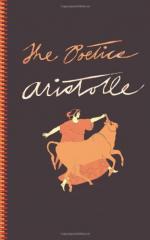
|
| Name: _________________________ | Period: ___________________ |
This test consists of 15 multiple choice questions and 5 short answer questions.
Multiple Choice Questions
1. What does Aristotle say about the element of surprise in a tragedy?
(a) It keeps the reader guessing and interested.
(b) It helps inspire pity.
(c) It helps inspire joy.
(d) It helps inspire sadness.
2. According to Aristotle, how does tragedy achieve the emotion it inspires?
(a) Using the element of surprise.
(b) Deceit.
(c) Contradiction.
(d) Irony.
3. What men does Aristotle consider to be "lower" types?
(a) Men who are defective in some way, but not altogether evil or malicious towards others.
(b) Unemployed men.
(c) Single men.
(d) Men who are poor and unhealthy.
4. Aristotle explains that actions described in a tragic plot should have certain characteristics. Which one of the following is NOT one of the characteristics that Aristotle identifies?
(a) Actions should be not too small or too large.
(b) Actions should be interesting.
(c) Actions should be minute and trivial.
(d) Actions should help the reader grasp the significance of the whole.
5. In art, Aristotle defines the medium as what?
(a) The manner in which the art is produced.
(b) A middle state or condition.
(c) The average.
(d) The artist's spiritual inspiration.
6. Per Aristotle, in which of the following ways does poetry NOT differ from history?
(a) Poetry is a higher pursuit than history.
(b) Poetry depicts what happens according to the "laws of probability and necessity."
(c) Poetry tells the future, and history tells the past.
(d) History is concerned simply with facts.
7. When a poet presents the poem in the voice of one of the characters, what method does Aristotle say that the poet is using?
(a) The method of recognition.
(b) The method of third person.
(c) The method of first person.
(d) The method of imitation.
8. The object poetry portrays is what, according to Aristotle?
(a) Other poets.
(b) Various places around the world.
(c) Tragic events.
(d) Men in action.
9. According to Aristotle, why do good poets sometimes write stories using episodic plots?
(a) They never write stories using episodic plots.
(b) Because episodic plots are considered more interesting.
(c) To showcase their skills in contests.
(d) For the challenge.
10. In how many ways does Aristotle say the method of imitation can differ?
(a) Four.
(b) Ten.
(c) Two.
(d) Countless.
11. In order for a plot to be truly effective in achieving the desired emotional response from its readers or audience, Aristotle says that the poet must do what?
(a) Pick characters that the audience can easily pity.
(b) Write a tragedy with a sad ending.
(c) Infuse irony throughout the story.
(d) Pick characters whose relationships to one another make the actions of the plot more interesting.
12. When the poet takes the appropriate steps in developing plot, Aristotle explains that the poet is much more likely to do what?
(a) Choose great characters.
(b) Have a strong ending.
(c) Have more consistencies in the plot.
(d) Have a strong beginning.
13. Per Aristotle, the unity of plot is what to the unity of a character's actions?
(a) Equivalent.
(b) Influential, but not important.
(c) Irrelevant.
(d) Not equivalent, but often closely related.
14. In poetry, Aristotle explains that the "Recognition" is almost always what?
(a) The end of the poem.
(b) A tragedy.
(c) Between two characters.
(d) A surprise.
15. How does Aristotle compare the medium of poetry and prose?
(a) Both use the same medium and rhythm.
(b) Both use the same medium.
(c) It is nothing like prose.
(d) Both use the same medium and meter.
Short Answer Questions
1. When a poet simply straightforwardly describes the events as they happen, what method does Aristotle say the poet is using?
2. Aristotle says what type of poetry imitates the "lower" types of men?
3. Aristotle says that at most, episodic plots involve what?
4. What type of story does Aristotle define as "episodic"?
5. What does Aristotle identify as the foundation of good poetry writing?
|
This section contains 641 words (approx. 3 pages at 300 words per page) |

|




